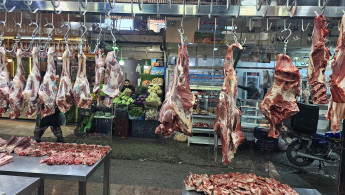As Ramadan approaches in Iraq, Food prices increase amid complaints of government inaction
As the holy Muslim month of Ramadan quickly approaches, meats and basic foodstuff prices have skyrocketed across Iraq, prompting authorities to permit importing live cattle and penalising greedy traders and market owners.
According to official government data, inflation rates in Iraq have risen by 4.5%, with a noticeable increase in price levels officially in the last month of 2023. Many Iraqi traders have exploited the rapprochement of the holy Muslim month of Ramadan by 11 March to increase prices, furthering the burden on ordinary Iraqis.
Asked by The New Arab, several people in Sulaimaniyah city in the northern Kurdistan region of Iraq complained about high prices of almost all things, especially meats and basic food materials, such as rice, bread flour and cocking oil.
The prices of lamb, mutton, and beef have risen to 24,000 Iraqi dinars (nearly US$19) per kilogram, while last year, the prices were 18,000 Iraqi dinars. One kilogram of chicken is also sold with 3,500 dinars and fish have reached nearly 12,000 dinars.
Local people are concerned that the prices will rise further during Ramadan, as the Kurdistan Regional Government (KRG) authorities do not pursue practical measures to regulate the prices.
"We as butchers are not to be blamed for the increase in the prices, as the prices of living cattle have risen to 10000 IDs due to increased taxes [by the KRG] on those who import sheep or cattle from neighbouring Syria and Iran," Barzan, a Kurdish youth working at a butcher shop downtown Sulaimaniyah told TNA. He also cautioned that if the Kurdish authorities did not lower imported cattle taxes, prices would rise in the holy month.
Recently, the Iraqi federal government, as well as the KRG, have permitted importing red meats that are sold at a lower price of 9000 IDs per kilogram, but the step could not lower the prices of fresh red meat in the markets.
Deteriorating relations between the two main ruling parties in the KRG, the Kurdistan Democratic Party (KDP) and the Patriotic Union of Kurdistan (PUK), have complicated the procedures of local traders. The KRG has yet to pay February's salaries to its civil servants.
According to the butchers, Iran has restricted cattle export to Iraq, as it also suffers from rising domestic prices. They also told TNA that the Iraqi Kurdistan region depends mainly on imported sheep from Syria, but traders should pay taxes twice to both the KDP and the PUK, causing prices to increase.
While the KDP dominates Erbil and Duhok provinces, the PUK runs Sulaimaniyah and Halabja. Both rival parties disagree on how to run the Kurdistan region and how the region's issues should be resolved in Baghdad. Locals accuse the ruling parties of "stealing" local revenues obtained from increased customs and smuggling oil to Iran and Turkey via tankers.
"One of the reasons for the increase in prices of red meat in the local markets is the significantly increased local demand for local red meat, specifically due to the Iraqi citizens' preference for it, away from imported meats which are available in the markets at moderate prices ranging between 9,000 dinars for mutton and 6,000 dinars for beef," Mohammed Al-Khzaai, the official spokesperson of the Iraqi Ministry of Agriculture, said in a statement.
"Another reason is the movement of all livestock breeders towards the desert areas due to the availability of water and green fodder in these areas as a result of the beneficial rains that fell during the current winter, providing them with a suitable environment for raising and fattening their livestock," Al-Khzaai added.
He also said the perishing of thousands of buffalo in the southern marsh areas due to drought last summer has contributed to the price rise.
On the other hand, the spokesperson for the Iraqi Ministry of Interior, Colonel Muqdad Al-Mousawi, told Al-Araby Al-Jadeed, TNA's Arabic sister website, that "legal measures will be taken against anyone attempting to manipulate food prices, taking advantage of the proximity of Ramadan."
He clarified that "some individuals are attempting to exploit Ramadan due to the increased shopping by citizens, which differs significantly from other months. Therefore, we have launched proactive monitoring and surveillance campaigns and have intelligence elements sending us information if any abnormal price manipulation or increases are detected."
He added, "We will be vigilant, and over the past months, we have arrested several individuals who have manipulated prices, whether of goods or even the exchange rates of the dollar by speculators, who have negatively affected the local market."
Meanwhile, the Iraqi Ministry of Trade recently promised to "supply large quantities of food items within the food basket project and the social care project, which provides seven basic items for the food basket and eleven items for social care to contribute to securing food for Iraqis and curbing price hikes."





 Follow the Middle East's top stories in English at The New Arab on Google News
Follow the Middle East's top stories in English at The New Arab on Google News


